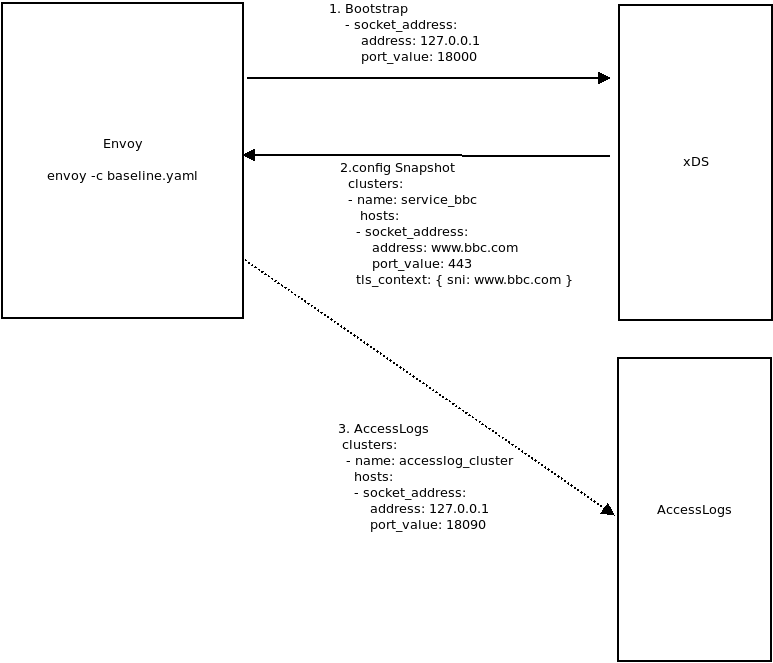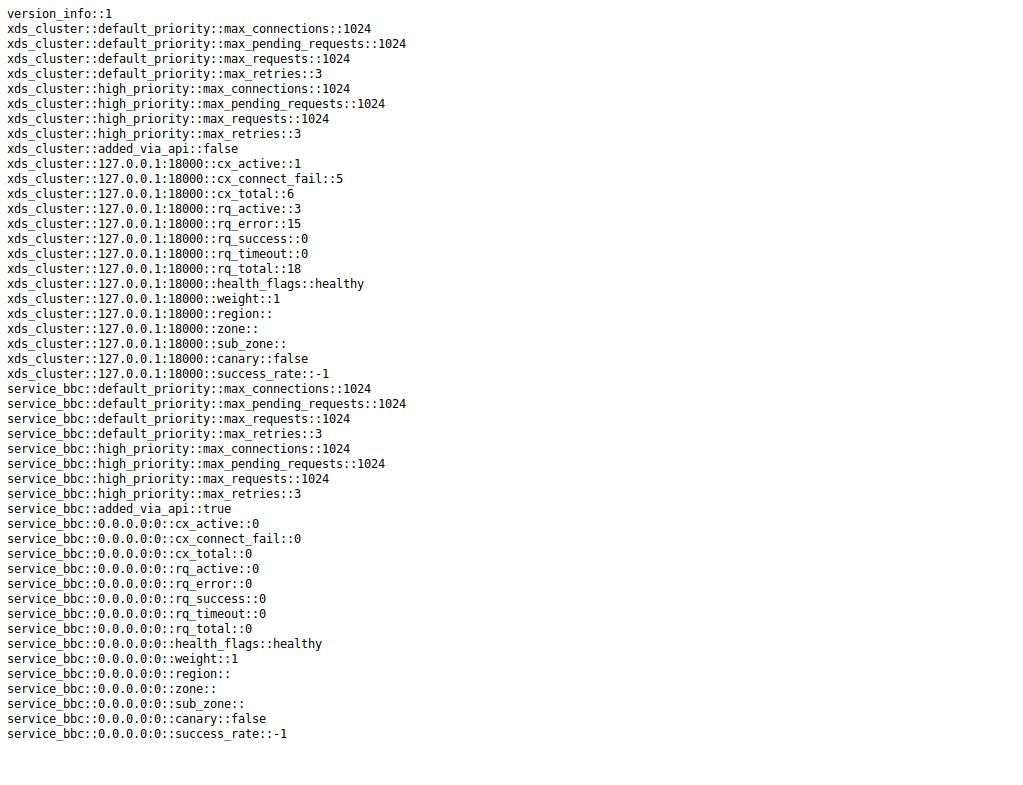A couple of weeks ago i wanted to program and understand how the control plane for Envoy Proxy works. I know its used in various comprehensive control systems like Istio and ofcourse at Lyft.
This repo/article describes a sample golang control plane for an Envoy Proxy. It demonstrates its dynamic configuration by getting a specific predetetermined setting set push to each proxy at runtime.
That is, once Envoy is started, it reads in an empty configuration which only tells it where the control plane gRPC server exists.
After connecting to the control plane, it receives configuration information to setup an upstream cluster and listener set. The
specific listener and cluster is trivial: it merely proxies a request for (and only for) https://www.bbc.com/robots.txt.
To run this sample, you need to install golang and Envoy binary itself.
Again, this repo/articleis just how I worked through setting this up...it not best practices but simply a 'hello world' config.
As a bonus, the control plane also launches an Access Log gRPC service. This service will receives access log stats dirctly from the proxy. Setting up the access log is not the primary focus of this article but I'll describe it in the appendix.
Note: much of the code and config i got here is taken from the Envoy integration test suite
- Matt Klien's blog
- Envoy Configuration Guide
- Envoy xDS data plane API
- Envoy golang control plane
- Envoy java control plane
cd envoy_control
export GOPATH=`pwd`
go get github.com/envoyproxy/go-control-plane/envoy/api/v2 \
github.com/envoyproxy/go-control-plane/envoy/api/v2/auth \
github.com/envoyproxy/go-control-plane/envoy/api/v2/core \
github.com/envoyproxy/go-control-plane/envoy/api/v2/listener \
github.com/envoyproxy/go-control-plane/envoy/api/v2/route \
github.com/envoyproxy/go-control-plane/envoy/config/filter/network/http_connection_manager/v2 \
github.com/envoyproxy/go-control-plane/envoy/data/accesslog/v2 \
github.com/envoyproxy/go-control-plane/envoy/service/accesslog/v2 \
github.com/envoyproxy/go-control-plane/envoy/service/discovery/v2 \
github.com/envoyproxy/go-control-plane/pkg/cache \
github.com/envoyproxy/go-control-plane/pkg/server \
github.com/envoyproxy/go-control-plane/pkg/wellknown \
github.com/golang/protobuf/ptypes \
github.com/sirupsen/logrus \
google.golang.org/grpcgo run src/main.go
Which should startup the control plane, access log service and REST->gRPC gateway (the latter again not in scope of this article)
$ go run src/main.go
INFO[0000] Starting control plane
INFO[0000] gateway listening HTTP/1.1 port=18001
INFO[0000] access log server listening port=18090
INFO[0000] management server listening port=18000The code is almost entirely contained in src/main.go which launhes the control plane and proceeds to setup a static config to proxy to a set of /robots.txt files from three sites:
[]string{"www.bbc.com", "www.yahoo.com", "blog.salrashid.me"}Every 60 seconds, the host will rotate over which means for the first 60 seconds, you'll see the robots.txt file from bbc, then yahoo then google.
Note, we increment the snapshot verision number and the host as well:
$ go run src/main.go
INFO[0000] Starting control plane
INFO[0000] gateway listening HTTP/1.1 port=18001
INFO[0000] access log server listening port=18090
INFO[0000] management server listening port=18000
INFO[0003] OnStreamOpen 1 open for type.googleapis.com/envoy.api.v2.Cluster
INFO[0003] OnStreamRequest
INFO[0003] cb.Report() callbacks fetches=0 requests=1
INFO[0003] >>>>>>>>>>>>>>>>>>> creating cluster service_bbc with remoteHost%!(EXTRA string=www.bbc.com)
INFO[0003] >>>>>>>>>>>>>>>>>>> creating listener listener_0
INFO[0003] >>>>>>>>>>>>>>>>>>> creating snapshot Version 1
INFO[0003] OnStreamResponse...
INFO[0003] cb.Report() callbacks fetches=0 requests=1
INFO[0003] OnStreamRequest
INFO[0004] OnStreamOpen 2 open for
INFO[0007] OnStreamOpen 3 open for type.googleapis.com/envoy.api.v2.Listener
INFO[0007] OnStreamRequest
INFO[0007] OnStreamResponse...
INFO[0007] cb.Report() callbacks fetches=0 requests=3
INFO[0007] OnStreamRequest
INFO[0063] >>>>>>>>>>>>>>>>>>> creating cluster service_bbc with remoteHost%!(EXTRA string=www.yahoo.com)
INFO[0063] >>>>>>>>>>>>>>>>>>> creating listener listener_0
INFO[0063] >>>>>>>>>>>>>>>>>>> creating snapshot Version 2
INFO[0063] OnStreamResponse...
INFO[0063] cb.Report() callbacks fetches=0 requests=4
INFO[0063] OnStreamResponse...
INFO[0063] cb.Report() callbacks fetches=0 requests=4
INFO[0063] OnStreamRequest
INFO[0063] OnStreamRequest
INFO[0123] >>>>>>>>>>>>>>>>>>> creating cluster service_bbc with remoteHost%!(EXTRA string=blog.salrashid.me)
INFO[0123] >>>>>>>>>>>>>>>>>>> creating listener listener_0
INFO[0123] >>>>>>>>>>>>>>>>>>> creating snapshot Version 3
INFO[0123] OnStreamResponse...
INFO[0123] OnStreamResponse...
INFO[0123] cb.Report() callbacks fetches=0 requests=6
INFO[0123] cb.Report() callbacks fetches=0 requests=6
INFO[0123] OnStreamRequest
INFO[0123] OnStreamRequest
You can review the code to see how the structure is nested and initialized.
If you just set the value to bbc and not iterate, the code will behave as if bbc.yaml config file was passed to envoy:
ctx := context.Background()
config = cache.NewSnapshotCache(mode == Ads, Hasher{}, logger{})
srv := xds.NewServer(ctx, config, cb)
atomic.AddInt32(&version, 1)
nodeId := config.GetStatusKeys()[1]
var clusterName = "service_bbc"
var remoteHost = "www.bbc.com"
var sni = "www.bbc.com"
log.Infof(">>>>>>>>>>>>>>>>>>> creating cluster " + clusterName)
h := &core.Address{Address: &core.Address_SocketAddress{
SocketAddress: &core.SocketAddress{
Address: remoteHost,
Protocol: core.SocketAddress_TCP,
PortSpecifier: &core.SocketAddress_PortValue{
PortValue: uint32(443),
},
},
}}
c := []cache.Resource{
&v2.Cluster{
Name: clusterName,
ConnectTimeout: ptypes.DurationProto(2 * time.Second),
ClusterDiscoveryType: &v2.Cluster_Type{Type: v2.Cluster_LOGICAL_DNS},
DnsLookupFamily: v2.Cluster_V4_ONLY,
LbPolicy: v2.Cluster_ROUND_ROBIN,
Hosts: []*core.Address{h},
TlsContext: &auth.UpstreamTlsContext{
Sni: sni,
},
},
} var listenerName = "listener_0"
var targetHost = "www.bbc.com"
var targetRegex = ".*"
var virtualHostName = "local_service"
var routeConfigName = "local_route"
log.Infof(">>>>>>>>>>>>>>>>>>> creating listener " + listenerName)
v := v2route.VirtualHost{
Name: virtualHostName,
Domains: []string{"*"},
Routes: []*v2route.Route{{
Match: &v2route.RouteMatch{
PathSpecifier: &v2route.RouteMatch_Regex{
Regex: targetRegex,
},
},
Action: &v2route.Route_Route{
Route: &v2route.RouteAction{
HostRewriteSpecifier: &v2route.RouteAction_HostRewrite{
HostRewrite: targetHost,
},
ClusterSpecifier: &v2route.RouteAction_Cluster{
Cluster: clusterName,
},
PrefixRewrite: "/robots.txt",
},
},
}}}
manager := &hcm.HttpConnectionManager{
CodecType: hcm.HttpConnectionManager_AUTO,
StatPrefix: "ingress_http",
RouteSpecifier: &hcm.HttpConnectionManager_RouteConfig{
RouteConfig: &v2.RouteConfiguration{
Name: routeConfigName,
VirtualHosts: []*v2route.VirtualHost{&v},
},
},
HttpFilters: []*hcm.HttpFilter{{
Name: wellknown.Router,
}},
}
pbst, err := ptypes.MarshalAny(manager)
if err != nil {
panic(err)
}
var l = []cache.Resource{
&v2.Listener{
Name: listenerName,
Address: &core.Address{
Address: &core.Address_SocketAddress{
SocketAddress: &core.SocketAddress{
Protocol: core.SocketAddress_TCP,
Address: localhost,
PortSpecifier: &core.SocketAddress_PortValue{
PortValue: 10000,
},
},
},
},
FilterChains: []*listener.FilterChain{{
Filters: []*listener.Filter{{
Name: wellknown.HTTPConnectionManager,
ConfigType: &listener.Filter_TypedConfig{
TypedConfig: pbst,
},
}},
}},
}} snap := cache.NewSnapshot(fmt.Sprint(version), nil, c, nil, l, nil)
config.SetSnapshot(nodeId, snap)Now start the envoy proxy with the baseline configurtion. Note, the config only tells envoy where to find the control plane (in this case, 127.0.0.1:18000)
$ envoy -c baseline.yaml -l debug
admin:
access_log_path: /dev/null
address:
socket_address:
address: 127.0.0.1
port_value: 9000
dynamic_resources:
ads_config:
api_type: GRPC
grpc_services:
- envoy_grpc:
cluster_name: xds_cluster
cds_config:
api_config_source:
api_type: GRPC
grpc_services:
- envoy_grpc:
cluster_name: xds_cluster
set_node_on_first_message_only: true
lds_config:
api_config_source:
api_type: GRPC
grpc_services:
- envoy_grpc:
cluster_name: xds_cluster
set_node_on_first_message_only: true
node:
cluster: service_greeter
id: test-id
static_resources:
clusters:
- connect_timeout: 1s
hosts:
- socket_address:
address: 127.0.0.1
port_value: 18000
http2_protocol_options: {}
name: xds_cluster
type: STATICYou can verify the cluster was dynamically added in by viewing the envoy admin console at http://localhost:9000. A sample output of that console:
Now you can use curl to access the robots.txt file on the upstream host thrrough the proxy. You're alble to do this now because
the control plane dynamically configured a cluster, listenr and upstream for you on bootstrap.
$ curl -v localhost:10000/
Warning: Setting custom HTTP method to HEAD with -X/--request may not work the
Warning: way you want. Consider using -I/--head instead.
* Trying ::1...
* TCP_NODELAY set
* connect to ::1 port 10000 failed: Connection refused
* Trying 127.0.0.1...
* TCP_NODELAY set
* Connected to localhost (127.0.0.1) port 10000 (#0)
> HEAD /robots.txt HTTP/1.1
> Host: localhost:10000
> User-Agent: curl/7.58.0
> Accept: */*
>
< HTTP/1.1 200 OK
< server: envoy
< last-modified: Tue, 17 Apr 2018 02:18:01 GMT
< etag: "363-56a01f2964840"
< cache-control: max-age=3600, public
< content-type: text/plain
< content-length: 867
< accept-ranges: bytes
< date: Thu, 26 Apr 2018 03:22:48 GMT
< via: 1.1 varnish
< age: 4812
< x-fastly-cache-status: HIT-STALE
< x-served-by: cache-sin18028-SIN
< x-cache: HIT
< x-cache-hits: 11
< x-timer: S1524712968.404276,VS0,VE0
< vary: Accept-Encoding
< x-envoy-upstream-service-time: 220
<
$ go run src/main.go
INFO[0000] Starting control plane
INFO[0000] gateway listening HTTP/1.1 port=18001
INFO[0000] access log server listening port=18090
INFO[0000] management server listening port=18000
INFO[0043] OnStreamOpen 1 open for
INFO[0043] OnStreamOpen 2 open for type.googleapis.com/envoy.api.v2.Cluster
INFO[0043] OnStreamRequest
INFO[0043] open watch 1 for type.googleapis.com/envoy.api.v2.Cluster[] from nodeID "test-id", version ""
INFO[0043] cb.Report() callbacks fetches=0 requests=1
INFO[0043] >>>>>>>>>>>>>>>>>>> creating cluster service_bbc
INFO[0043] >>>>>>>>>>>>>>>>>>> creating listener listener_0
INFO[0043] >>>>>>>>>>>>>>>>>>> creating snapshot Version 1
INFO[0043] respond open watch 1[] with new version "1"
INFO[0043] respond type.googleapis.com/envoy.api.v2.Cluster[] version "" with version "1"
INFO[0043] OnStreamResponse...
INFO[0043] cb.Report() callbacks fetches=0 requests=1
INFO[0043] OnStreamRequest
INFO[0043] open watch 2 for type.googleapis.com/envoy.api.v2.Cluster[] from nodeID "test-id", version "1"
INFO[0043] OnStreamOpen 3 open for type.googleapis.com/envoy.api.v2.Listener
INFO[0043] OnStreamRequest
INFO[0043] respond type.googleapis.com/envoy.api.v2.Listener[] version "" with version "1"
INFO[0043] OnStreamResponse...
INFO[0043] cb.Report() callbacks fetches=0 requests=3
INFO[0043] OnStreamRequest
INFO[0043] open watch 3 for type.googleapis.com/envoy.api.v2.Listener[] from nodeID "test-id", version "1"
$ envoy -c baseline.yaml
[2018-04-25 20:22:10.259][158107][info][main] source/server/server.cc:178] initializing epoch 0 (hot restart version=9.200.16384.127.options=capacity=16384, num_slots=8209 hash=228984379728933363)
[2018-04-25 20:22:10.262][158107][info][upstream] source/common/upstream/cluster_manager_impl.cc:128] cm init: initializing cds
[2018-04-25 20:22:10.263][158107][info][config] source/server/configuration_impl.cc:52] loading 0 listener(s)
[2018-04-25 20:22:10.263][158107][info][config] source/server/configuration_impl.cc:92] loading tracing configuration
[2018-04-25 20:22:10.263][158107][info][config] source/server/configuration_impl.cc:119] loading stats sink configuration
[2018-04-25 20:22:10.263][158107][info][main] source/server/server.cc:353] starting main dispatch loop
[2018-04-25 20:22:10.266][158107][info][upstream] source/common/upstream/cluster_manager_impl.cc:356] add/update cluster service_bbc
[2018-04-25 20:22:10.338][158107][info][upstream] source/common/upstream/cluster_manager_impl.cc:132] cm init: all clusters initialized
[2018-04-25 20:22:10.338][158107][info][main] source/server/server.cc:337] all clusters initialized. initializing init manager
[2018-04-25 20:22:10.343][158107][info][upstream] source/server/lds_api.cc:60] lds: add/update listener 'listener_0'
[2018-04-25 20:22:10.343][158107][info][config] source/server/listener_manager_impl.cc:583] all dependencies initialized. starting workers
The following config emits access_logs for upstream systems to your own endpoint.
The accesslog config is taken fron the test suite resource.go given by the accesslog.proto.
Basically, when you configure a listener, you can configure a target to emit access_logs as shown below.
The sample service provided in this sample also starts a gRPC service implementing AccessLogService.
# Base config for an ADS management server on 18000, admin port on 19000
admin:
access_log_path: /tmp/admin_access.log
address:
socket_address:
address: 127.0.0.1
port_value: 9000
node:
cluster: service_greeter
id: test-id
static_resources:
listeners:
- name: listener_0
address:
socket_address: { address: 0.0.0.0, port_value: 10000 }
filter_chains:
- filters:
- name: envoy.http_connection_manager
config:
stat_prefix: ingress_http
codec_type: AUTO
route_config:
name: local_route
virtual_hosts:
- name: local_service
domains: ["*"]
routes:
- match: { regex: ".*" }
route: { host_rewrite: www.bbc.com, cluster: service_bbc, prefix_rewrite: "/robots.txt" }
http_filters:
- name: envoy.router
access_log:
- name: envoy.http_grpc_access_log
config:
common_config:
grpc_service:
envoy_grpc:
cluster_name: accesslog_cluster
log_name: accesslog
clusters:
- name: accesslog_cluster
connect_timeout: 2s
hosts:
- socket_address:
address: 127.0.0.1
port_value: 18090
http2_protocol_options: {}
- name: service_bbc
connect_timeout: 2s
type: LOGICAL_DNS
dns_lookup_family: V4_ONLY
lb_policy: ROUND_ROBIN
hosts: [{ socket_address: { address: bbc.com, port_value: 443 } } ]
tls_context: { sni: www.bbc.com }The following yaml is equivalent static configurtion to what main.go does and is provided so you can compare how it gets initialized in code.
To run this config, pass --onlyLogging switch to the control plane
$ envoy -c logs.yaml
and then the control plane (which also starts the access_log server)
$ go run src/main.go --onlyLogging
INFO[0000] Starting control plane
INFO[0000] access log server listening port=18090
and access the listener on
$ curl -vk http://localhost:10000/robots.txt
you should see access_logs emitted to on the same stdout as before:
$ go run src/main.go --onlyLogging
INFO[0000] Starting control plane
INFO[0000] access log server listening port=18090
INFO[0005] AccessLog: [accesslog2018-04-25T23:46:40-07:00] www.bbc.com /robots.txt https 200 3f1305d5-3616-400c-a352-93b99ff2af18 service_bbc
INFO[0006] AccessLog: [accesslog2018-04-25T23:46:41-07:00] www.bbc.com /robots.txt https 200 afc0ef05-feb8-4acc-beca-46c8c894eada service_bbc
INFO[0008] AccessLog: [accesslog2018-04-25T23:46:43-07:00] www.bbc.com /robots.txt https 200 59b53195-c0b7-47c9-a1c5-b86d3d5c1253 service_bbc
INFO[0009] AccessLog: [accesslog2018-04-25T23:46:45-07:00] www.bbc.com /robots.txt https 200 7cabd456-1fc1-4294-8c67-c4a6e7e4bd23 service_bbc I wrote this primarly just to understand how envoy works..As this is the first time i've configured and worked through the structures within Envoy, its very likely i've missed some construct or concept. If you see anythign amiss, please drop me a line and I'll correct it.

